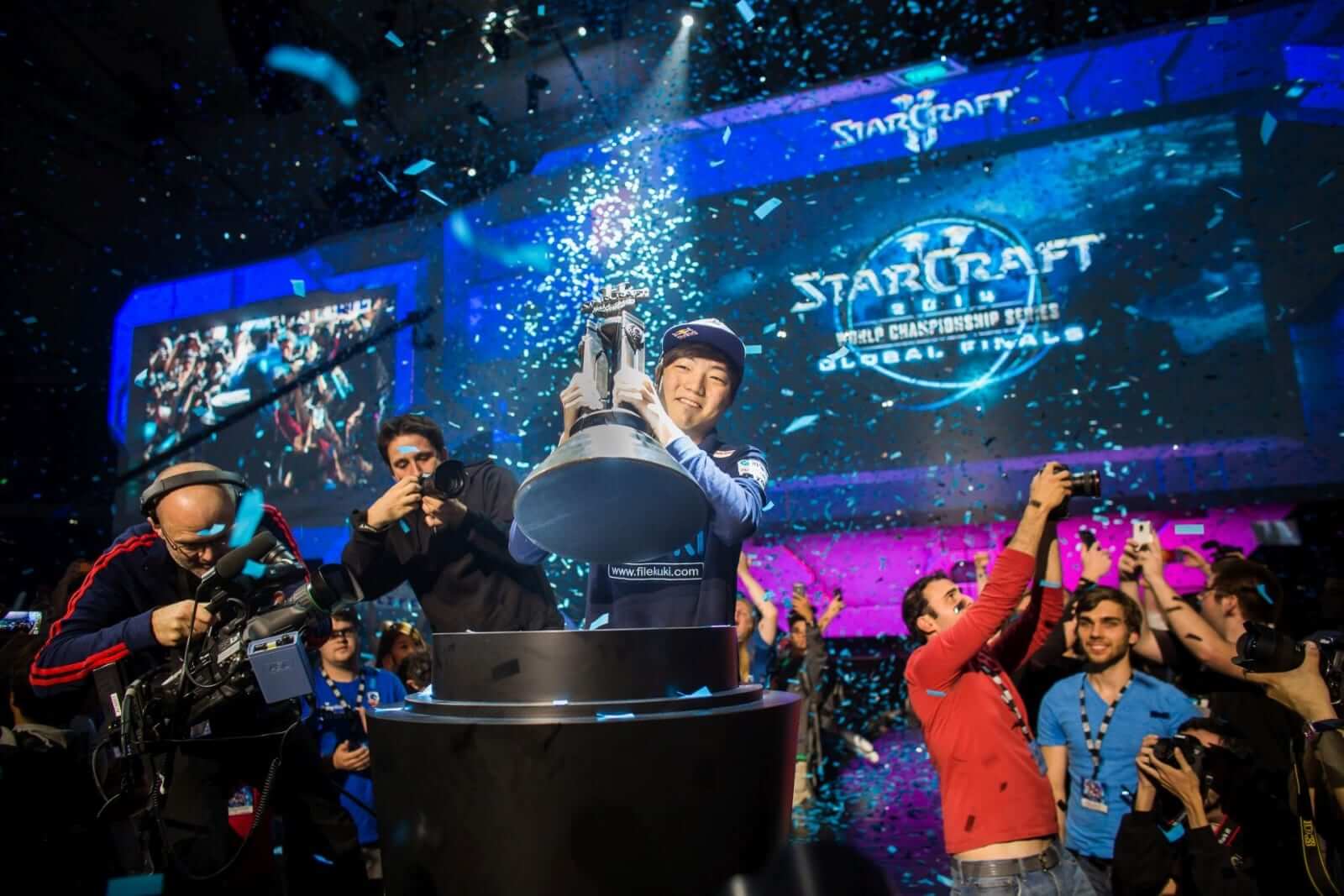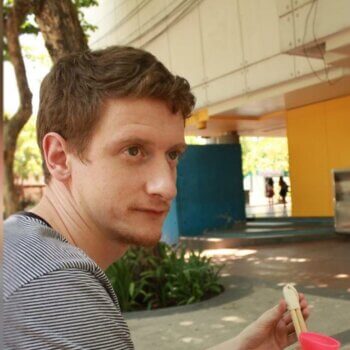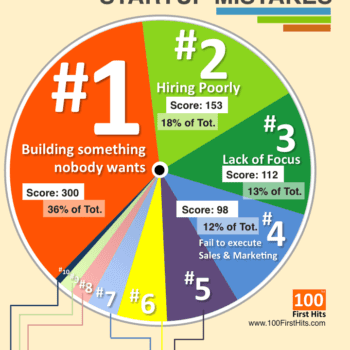Journey into the mind of Ma Jae Yoon as he rises to the stage, the fans roar and hold out signs of his name. As he sits down and prepares, he is no longer Ma Jae Yoon, but now sAvior – The Destroyer. His coach, his teammates all lean towards the monitor as the countdown begins. “5… 4… 3… 2… 1… 0…” the landscape rapidly changes to a distant planet, in which he governs a savage bug-like alien race, known as Zerg. Neurons blaze constantly through his head, his fingers and hands move rapidly at blistering speeds, hammering down on more than 200 keys and clicks per minute, at the same time his mind calculates hundreds of logical actions all built into him through hours of dedication and practice. For anywhere between 5 to 50 minutes, Ma Jae Yoon shows the nation the brilliance of why he is, “The Maestro”.
Ma Jae Yoon is a star player in the game of StarCraft, his team – CJ Entus; a team that is sponsored by CJ, a large South Korean conglomerate, originally a part of the internationally known corporation Samsung.
CJ is a producer of processed foods, retail, and recently movie theatres by constructing the largest movie theatre in South Korea. Ma Jae Yoon, or more commonly known worldwide by his game name Savior, is portrayed as a sex symbol by the media, and possess a large fan base of thousands of Korean teenage girls. His face is plastered all over nation, on billboards, commercials, and even on credit cards. He is considered one of the largest celebrities in Korea, and all of this is thanks to his stellar performance in a computer game.
Although all this seems glamorous, Savior is unable to socialize with his fans and family through his endless practice. A recent BBC article reveals that he follows a strict schedule of waking up early at 8 AM followed by eating breakfast with his teammates and practice partners, then practicing until 12 Midnight. An article from BBC reveals “Ma Jae-Yoon’s bedroom is full of presents from adoring female fans, including his dog, Ari. For many of these players, Ari is the only female companionship they allow themselves.”
To the average North American, all of this may seem shocking, and even looked down upon, but truly in South Korea, professional gaming, or e-Sports an important cultural aspect. In terms of history, South Korea currently is in a state of technological advancement, all thanks to the cyber gaming. Early in the decade, South Korea was suffering due to tensions with the North, and as a result was in a stage of depression.
StarCraft, recently surfacing as an extremely competitive game at the time, had much of the strong competition centered in South Korea.
“It follows a macroeconomic reason too because it follows around of the 1990s when the Asian financial crisis took place it was also a time when broadband was subsidized, cheap PCs as well and being rolled out across the country. A lot of people out of work and with a lot of broadband, PCs and free time on their hands. That was a factor too.” – CNN Reporter Kristie Lu Stout
With South Korea being internationally known for its competition, many foreign players began to migrate to South Korea to play in tournaments. Players usually competed in Internet Cafes, more commonly known as PC Bangs in S. Korea, due to the lag in internet connections, and affordability of computers initially. It is estimated that in 2001, in S. Korea, 28% of the population had internet connections, and 1/5th of the users played online games. KeSPA – Korean e-Sports Progaming Association played an extremely important role in Korea’s progaming development. Established in 2000 with the approval of the Ministry of Culture, Sports, and Tourism.
KeSPA began doing research and organizing several key points into the success of e-Sports. With the help of KeSpa, S. Korean television shortly started televising tournaments, and games, and this was shockingly successful. WCG – The World Cyber Games was hosted in South Korea in 2001, and was extremely successful in drawing tens of thousands of fans to the stage. S. Korea entered into a gaming craze as thousands of PC Bangs began to open, and players around the world wanted to migrate to Korea for the competition. The number of Internet users grew to 34 120 000, and 55% of the entire population were playing online, in just 5 years! South Korea’s economy grew with the success of the game. Culturally, the nation began to change – children and adults together, aspired to be like these progamers. Pro Gamer – is short for professional gamer, Progamer – is the term to denote the professional gaming athlete.
StarCraft Player Xellos’ mom cries after her son says “I am here because of you. I love you mum!” and winning OSL – the largest tournament in South Korea
It is shocking, since the North American mentality that kids should put finishing school and studies to ultimately achieving a steady job before playing games. In comparison, South Korea is very much similar in that regard, however with the phenomena of e-Sports, we are beginning to see a radical change, pushing the fact that gaming can lead to somewhere.
Stories, like Xellos’ inspire fans across the world to aspire to succeed as progamers, and help break the generational barriers. Unfortunately, the cultural distinction of North America causes many difficulties with e-Sport’s international development. With cases like Brandon Crisp – depicted by the media against gaming, North America’s view of professional gaming become incredibly biased. For fans and for gamers, the North American media pits predominant North American culture, and social values against the e-Sport culture – a definite difference lies in cultural values. To a North American a “progamer” is frowned upon. Putting hours of dedication in a game would be considered ridiculous.
An adolescent gamer in North America, would not be considered and athlete, would be titled a geek, or nerd, and would be ridiculed by elders and have great difficulty with their parents. The digital divide from generations, greatly affects the current. There is extreme difficulty with the progression of culture due to technological advancements.
Despite South Korea’s celebrity status of progamers, North Americans are seen with a majority ignorant or uneducated of South Korean culture. Fan’s state how progamers are seen like attractive as “Matt Damon”, and athletic like “Tiger Woods, or Michael Jordan” as a Fan from a CNN report joyfully explained, where in North America, gamers can be depicted as “addicts” and even “psychopaths” in the media. All of which is backed up by poorly referenced psychological studies. The media oversimplifies and unfairly use cases like Brandon Crisp, and the Virginia Tech massacre, and accuse gaming as the root. In detail, Seung-Hui Cho, the Virginia Tech shooter, had a history of psychological issues that was blatantly blamed on video games, and for Brandon Crisp, there is an over simplification of the video game accusation, perhaps used as a scapegoat of parenting.
In a nation like Korea, where e-Sports are accepted, one experiences the vividness of the e-Sport culture. The fan’s gathering and cheering, the sport of competition, to the tears of coaches and parent’s of players, e-Sports brings hope and joy to the nation. Something that is considered a counterculture in North America is so much enriching the culture of another. The ignorance is clearly seen of not adapting to newer culture and therefore we suspend our capacity, unable to experience everything in the name of progression.
Perhaps there is progression in North America’s acceptance of online game competition. In a recent development, the University of Berkely in California, a really well known school, recently opened a course a mathematical heavy course in StarCraft. With prequisites in calculus, the course focuses a lot on the theory of the game, as well as examines the impacts of South Korean progamers. Recently the first class was filmed by GamePro Magazine, a large American game magazine.
How far will StarCraft last in North America, will it one day to influence and one day create bring out true olympic grade professional gamers?
“I have never regretted what I do. I think my job is the best job because more than anything else I get to do what I like”- StarCraft Progamer, Kang Min A.K.A Nal_ra – “The Dreamer”.
This article was produced by Michael Jones and Gail Benick. see more.































